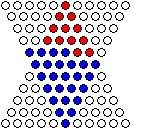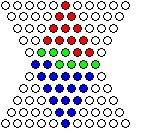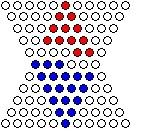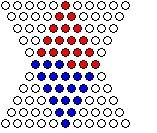Opinions on a Rules Mechanic?
I hesitate a bit to add a new topic to an already extensive list. I don't think there's an existing "let's try out ideas for mechanics" thread, but if there is one, perhaps this discussion will be taken there. Otherwise, here goes.
I'm writing an entry for the called (currently) . When coming up with rules mechanics for it, I hit upon a novel idea that would greatly facilitate some aspects of gameplay while probably hindering others, and I'm not sure whether or not it's worth the hassle. I'd love to hear your opinions.
The situation is this: Action rolls are made against a character's ability value. That value may be modified by one or more skill values (which may be positive or negative), possibly from more than one character (if everyone in the group is kibbitzing). I could have them roll against each applicable value, with the margins of success stacking, but I'm really trying to cut down on the roll-playing here. So I thought of the following...
I'm a big fan of what I call pyramidal cost schemes (can any mathematicians out there inform me as to the proper word for this type of progression?) where the cost for a new level equals the level number, so the progression goes like this: 1, 3, 6, 10, 15, 21, 28, ... So maybe, I thought, instead of assigning points to a skill to get a level (say, 15 pts for a +5), just assign points and calculate the level during play. This way, multiple skills could be used by adding the assigned points and calculating the end level from the total. Theoretically, any number of modifiers could be used, with ever-diminishing returns.
For example, say you have two skills that apply to a given roll, both at 15p (worth +5). Add them and they give 30p, worth +7, not +10. Or three professionals are cooperating on a task, their skills at 28p, 30p and 33p (individually worth +7 each). Together, they have 91p, so the task is rolled at +13. Or a dozen guys are applying their big 1p expertises to something: a 12p total will get you +4, so while they are more likely to get something done, mostly they're just getting in each other's way.
Now, I consider look-up tables during play to be bad form, but if the values never went beyond the low tens, the table could be printed on the character sheet. And I know I've worked with such schemes long enough that I can spit out the most common results off the top of my head. The question is, would it work for other people, or would it just result in endless calculations and table referencing? (Also, has someone already tried implementing a system like this?)
And of course, if anyone is inspired to run with the concept and create something else based on it, then go for it! n__n
I'm writing an entry for the called (currently) . When coming up with rules mechanics for it, I hit upon a novel idea that would greatly facilitate some aspects of gameplay while probably hindering others, and I'm not sure whether or not it's worth the hassle. I'd love to hear your opinions.
The situation is this: Action rolls are made against a character's ability value. That value may be modified by one or more skill values (which may be positive or negative), possibly from more than one character (if everyone in the group is kibbitzing). I could have them roll against each applicable value, with the margins of success stacking, but I'm really trying to cut down on the roll-playing here. So I thought of the following...
I'm a big fan of what I call pyramidal cost schemes (can any mathematicians out there inform me as to the proper word for this type of progression?) where the cost for a new level equals the level number, so the progression goes like this: 1, 3, 6, 10, 15, 21, 28, ... So maybe, I thought, instead of assigning points to a skill to get a level (say, 15 pts for a +5), just assign points and calculate the level during play. This way, multiple skills could be used by adding the assigned points and calculating the end level from the total. Theoretically, any number of modifiers could be used, with ever-diminishing returns.
For example, say you have two skills that apply to a given roll, both at 15p (worth +5). Add them and they give 30p, worth +7, not +10. Or three professionals are cooperating on a task, their skills at 28p, 30p and 33p (individually worth +7 each). Together, they have 91p, so the task is rolled at +13. Or a dozen guys are applying their big 1p expertises to something: a 12p total will get you +4, so while they are more likely to get something done, mostly they're just getting in each other's way.
Now, I consider look-up tables during play to be bad form, but if the values never went beyond the low tens, the table could be printed on the character sheet. And I know I've worked with such schemes long enough that I can spit out the most common results off the top of my head. The question is, would it work for other people, or would it just result in endless calculations and table referencing? (Also, has someone already tried implementing a system like this?)
And of course, if anyone is inspired to run with the concept and create something else based on it, then go for it! n__n





